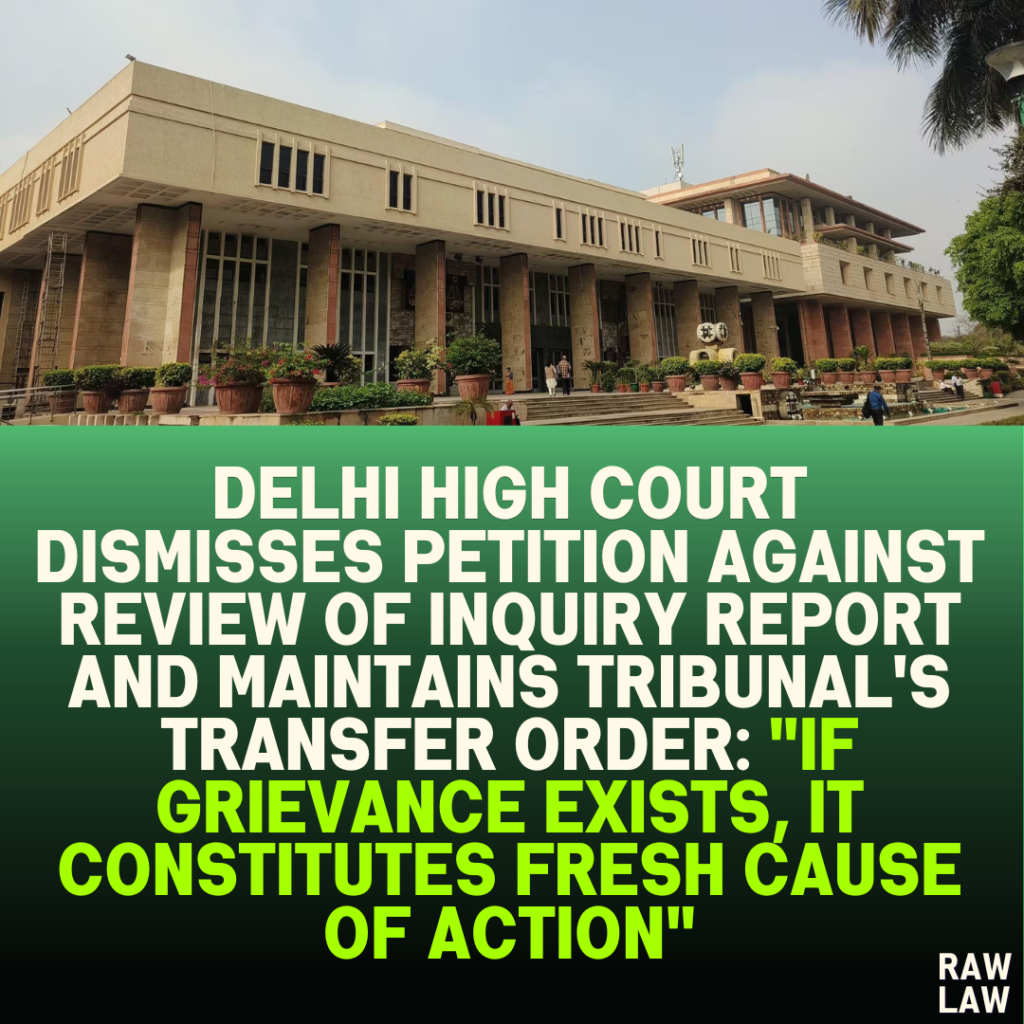Court’s Decision:
The Delhi High Court dismissed a petition challenging the review of an inquiry report by the disciplinary authority and upheld the Central Administrative Tribunal’s (CAT) decision rejecting the challenge to the petitioner’s transfer from Delhi to Nagpur. The High Court, in its earlier order, had directed the respondents to conclude the inquiry within four months. The court emphasized, “If the grievance of the petitioner is about the manner in which the inquiry is proceeding, it constitutes a fresh cause of action, for which the petitioner would have to avail his remedies in accordance with law.”
Facts:
- The petitioner was transferred from Delhi to Nagpur by an order dated 30 July 2021.
- The petitioner challenged the transfer order before the Central Administrative Tribunal (CAT), which dismissed the plea on 24 December 2021.
- The petitioner subsequently filed W.P.(C) 876/2022 before the Delhi High Court challenging the CAT order.
- On 13 March 2024, the High Court dismissed the writ petition, stating there was no ground to interfere with the Tribunal’s decision but directed the respondent to conclude the inquiry against the petitioner within four months, subject to his cooperation.
- The petitioner then filed the current application, seeking directions to prevent the review of the inquiry report by the disciplinary authority and requesting the report submitted in May 2024 be treated as final.
Issues:
- Whether the review of the inquiry report by the disciplinary authority is valid.
- Whether the petitioner’s application to stop the review of the inquiry report and to allow him to join at his earlier place of posting is maintainable after the disposal of the writ petition.
Petitioner’s Arguments:
- The petitioner argued that the inquiry report prepared in May 2024 should be treated as final and should not be altered or reviewed by the disciplinary authority.
- The petitioner sought directions to not change the inquiry report and to allow him to join Dr. RML Hospital, Delhi, as per the transfer order dated 01 August 2024.
Respondent’s Arguments:
- The respondents submitted that the inquiry is still ongoing and subject to the disciplinary authority’s review.
- They argued that the application is not maintainable as the writ petition has already been disposed of, and any grievance concerning the ongoing inquiry would be a fresh cause of action.
Analysis of the Law:
The court examined whether an application can be maintained for a matter that has already been disposed of. As per settled legal principles, once a writ petition is disposed of, a fresh application cannot be entertained unless there is a new cause of action. The High Court noted that the petitioner’s grievance regarding the inquiry process would constitute a new cause of action, requiring a separate remedy in law.
Precedent Analysis:
The court relied on established precedents that disallow revisiting or altering an order unless a substantial change in circumstances creates a new cause of action. The principle that a petitioner must seek a new remedy in accordance with law for a fresh grievance was upheld.
Court’s Reasoning:
The court reasoned that since the grievance pertains to the ongoing inquiry and potential review of the report, it constitutes a separate cause of action. The petitioner cannot challenge the same under a disposed writ petition. “If that is the grievance of the petitioner, it constitutes a fresh cause of action, for which the petitioner would have to avail his remedies in accordance with law,” the court emphasized.
Conclusion:
The application was dismissed as withdrawn. The petitioner’s counsel sought leave to withdraw the application, which was allowed by the court. The writ petition thus stands closed without any further relief granted to the petitioner.
Implications:
The ruling clarifies that an aggrieved party cannot seek relief on matters arising after the disposal of a writ petition without initiating a fresh cause of action. This decision reinforces the principle that inquiries by disciplinary authorities, once concluded, can only be challenged separately if new grievances arise.
